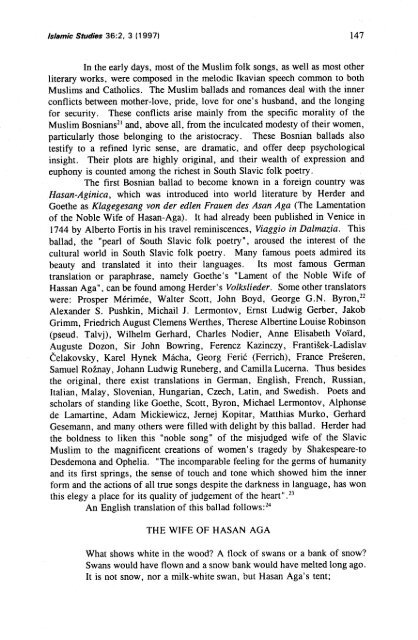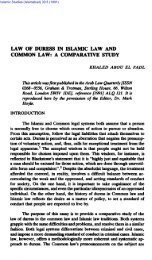You also want an ePaper? Increase the reach of your titles
YUMPU automatically turns print PDFs into web optimized ePapers that Google loves.
Islamic Studies 3 6 : 2, 3 ( 1 9 9 7 147<br />
In the early days, most of the Muslim folk songs, as well as most other<br />
literary works, were composed in the melodic Ikavian speech common to both<br />
Muslims and Catholics. The Muslim ballads and romances deal with the inner<br />
conflicts between mother-love, pride, love for one's husband, and the longing<br />
for security. These conflicts arise mainly from the specific morality of the<br />
Muslim Bosnians2' and, above all, from the inculcated modesty of their women,<br />
particularly those belonging to the aristocracy. These Bosnian ballads also<br />
testify to a refined lyric sense, are dramatic, and offer deep psychological<br />
insight. Their plots are highly original, and their wealth of expression and<br />
euphony is counted among the richest in South Slavic folk poetry.<br />
The first Bosnian ballad to become known in a foreign country was<br />
Hasan-Aginica, which was introduced into world literature by Herder and<br />
Goethe as Klagegesang von der edlen Frauen des Asan Aga (The Lamentation<br />
of the Noble Wife of Hasan-Aga). It had already been published in Venice in<br />
1744 by Alberto Fortis in his travel reminiscences, Viaggio in Dalmazia. This<br />
ballad, the "pearl of South Slavic folk poetry", aroused the interest of the<br />
cultural world in South Slavic folk poetry. Many famous poets admired its<br />
beauty and translated it into their languages. Its most famous German<br />
translation or paraphrase, namely Goethe's "Lament of the Noble Wife of<br />
Hassan Aga", can be found among Herder's Volkrlieder. Some other translators<br />
were: Prosper Merimee, Walter Scott, John Boyd, George G.N. Byron,'*<br />
Alexander S. Pushkin, Michail J. Lermontov, Ernst Ludwig Gerber, Jakob<br />
Grimm, Friedrich August Clemens Werthes, Therese Albertine Louise Robinson<br />
(pseud. Talvj), Wilhelm Gerhard, Charles Nodier, Anne Elisabeth Voiard,<br />
Auguste Dozon, Sir John Bowring, Ferencz Kazinczy, Frantiiek-Ladislav<br />
Celakovsky, Karel Hynek Macha, Georg FeriC (Ferrich), France Preieren,<br />
Samuel Roinay, Johann Ludwig Runeberg, and Camilla Lucerna. Thus besides<br />
the original, there exist translations in German, English, French, Russian,<br />
Italian, Malay, Slovenian, Hungarian, Czech, Latin, and Swedish. Poets and<br />
scholars of standing like Goethe, Scott, Byron, Michael Lermontov, Alphonse<br />
de Lamartine, Adam Mickiewicz, Jernej Kopitar, Matthias Murko, Gerhard<br />
Gesemann, and many others were filled with delight by this ballad. Herder had<br />
the boldness to liken this "noble song" of the misjudged wife of the Slavic<br />
Muslim to the magnificent creations of women's tragedy by Shakespeare-to<br />
Desdemona and Ophelia. "The incomparable feeling for the germs of humanity<br />
and its first springs, the sense of touch and tone which showed him the inner<br />
form and the actions of all true songs despite the darkness in language, has won<br />
this elegy a place for its quality of judgement of the heart" .23<br />
An English translation of this ballad follow^:'^<br />
THE WIFE OF HASAN AGA<br />
What shows white in the wood? A flock of swans or a bank of snow?<br />
Swans would have flown and a snow bank would have melted long ago.<br />
It is not snow, nor a milk-white swan, but Hasan Aga's tent;
















